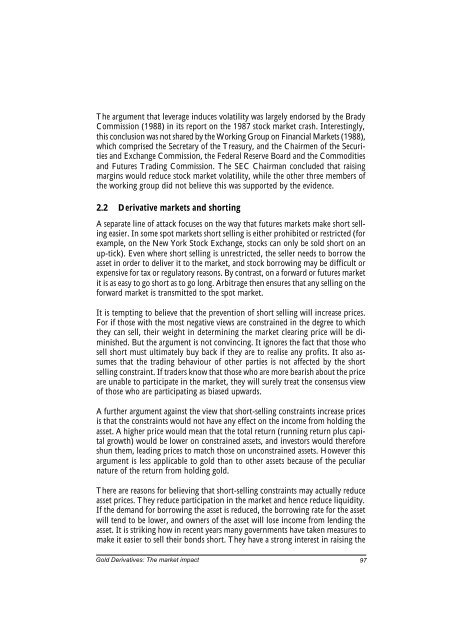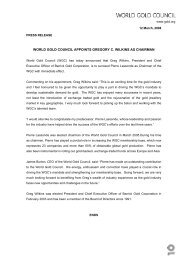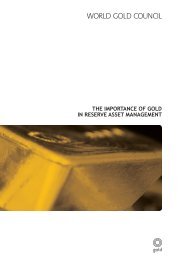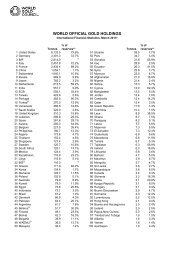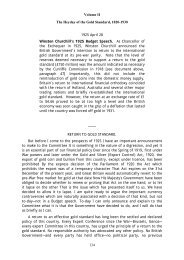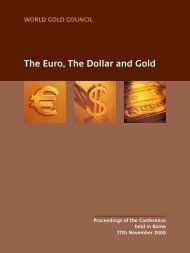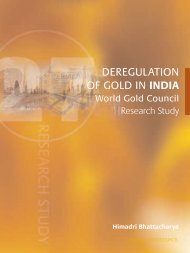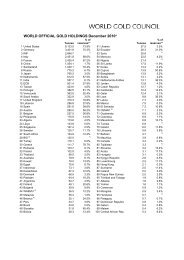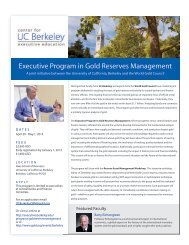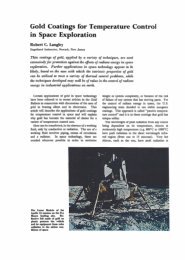Gold Derivatives: Gold Derivatives: - World Gold Council
Gold Derivatives: Gold Derivatives: - World Gold Council
Gold Derivatives: Gold Derivatives: - World Gold Council
Create successful ePaper yourself
Turn your PDF publications into a flip-book with our unique Google optimized e-Paper software.
The argument that leverage induces volatility was largely endorsed by the Brady<br />
Commission (1988) in its report on the 1987 stock market crash. Interestingly,<br />
this conclusion was not shared by the Working Group on Financial Markets (1988),<br />
which comprised the Secretary of the Treasury, and the Chairmen of the Securities<br />
and Exchange Commission, the Federal Reserve Board and the Commodities<br />
and Futures Trading Commission. The SEC Chairman concluded that raising<br />
margins would reduce stock market volatility, while the other three members of<br />
the working group did not believe this was supported by the evidence.<br />
2.2 Derivative markets and shorting<br />
A separate line of attack focuses on the way that futures markets make short selling<br />
easier. In some spot markets short selling is either prohibited or restricted (for<br />
example, on the New York Stock Exchange, stocks can only be sold short on an<br />
up-tick). Even where short selling is unrestricted, the seller needs to borrow the<br />
asset in order to deliver it to the market, and stock borrowing may be difficult or<br />
expensive for tax or regulatory reasons. By contrast, on a forward or futures market<br />
it is as easy to go short as to go long. Arbitrage then ensures that any selling on the<br />
forward market is transmitted to the spot market.<br />
It is tempting to believe that the prevention of short selling will increase prices.<br />
For if those with the most negative views are constrained in the degree to which<br />
they can sell, their weight in determining the market clearing price will be diminished.<br />
But the argument is not convincing. It ignores the fact that those who<br />
sell short must ultimately buy back if they are to realise any profits. It also assumes<br />
that the trading behaviour of other parties is not affected by the short<br />
selling constraint. If traders know that those who are more bearish about the price<br />
are unable to participate in the market, they will surely treat the consensus view<br />
of those who are participating as biased upwards.<br />
A further argument against the view that short-selling constraints increase prices<br />
is that the constraints would not have any effect on the income from holding the<br />
asset. A higher price would mean that the total return (running return plus capital<br />
growth) would be lower on constrained assets, and investors would therefore<br />
shun them, leading prices to match those on unconstrained assets. However this<br />
argument is less applicable to gold than to other assets because of the peculiar<br />
nature of the return from holding gold.<br />
There are reasons for believing that short-selling constraints may actually reduce<br />
asset prices. They reduce participation in the market and hence reduce liquidity.<br />
If the demand for borrowing the asset is reduced, the borrowing rate for the asset<br />
will tend to be lower, and owners of the asset will lose income from lending the<br />
asset. It is striking how in recent years many governments have taken measures to<br />
make it easier to sell their bonds short. They have a strong interest in raising the<br />
<strong>Gold</strong> <strong>Derivatives</strong>: The market impact 97


